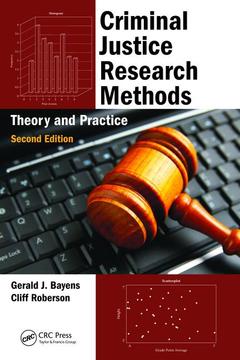Criminal Justice Research Methods (2nd Ed.) Theory and Practice, Second Edition
Auteurs : Bayens Gerald J., Roberson Cliff

The study of research methodologies can be daunting to many students due to complex terminology, mathematical formulas, and lack of practical examples. Now in its second edition, Criminal Justice Research Methods: Theory and Practice offers a straightforward, easy-to-understand text that clarifies this complex subject matter, keeping perplexing research language and associated complexities to a minimum and ensuring that students get a practical grasp of this essential topic.
The authors discuss scientific inquiry, establishing a framework for thinking about and understanding the nature of research. They examine various types of research methods in the broad categories of quantitative, qualitative, and evaluation designs and provide coverage of analytical and experimental research designs. The book also examines survey methods, survey instruments, and questionnaires, including wording, organization, and pretesting. It describes the fundamental characteristics of the qualitative approach, setting the stage for an in-depth discussion of the participant observation and case study methods of research. Other topics include ethical standards of conduct, topic selection, literature review, and guidelines for writing a research report or grand proposal. The second edition features updated examples, reworked exercises, additional discussion points, and new research-in-action sections.
Defining a clear approach to the study of research, the book enables student experiencing their initial exposure to this subject to be fundamentally prepared to be proficient researchers in criminal justice and criminology.
Introduction to Research. Research Design. Statistics in Research. Measures, Validity, and Reliability. Analytical and Experimental Research. Survey Research Methods and Sampling. Participant Observation and Case Studies. Decriptive, Historical, and Archival Data Analyses. Ethics in Research. Developing Research Plans. Writing Research Reports. Program Evaluation and Policy Research. Writing Research and Grant Proposals. Index.
Date de parution : 08-2017
15.6x23.4 cm
Date de parution : 12-2010
15.6x23.4 cm
Thème de Criminal Justice Research Methods :
Mots-clés :
Criminal Justice Research Methods; Fixed Point Estimate; Statistical Concepts; Institutional Review Board; Criminal Justice Research; Post-test Control Group Design; Ethics In Research; Literature Review; Criminal Justice Researchers; Quantitative Research; Criminal Homicide; Criminal Justice Sciences; Data Analysis Plan; Case Study; SSO; Low IQ; Policy Research Project; Equivalent Time Samples Design; Tv Violence; Experimental Research Design; Classical Experimental Design; Pure Research; Program Evaluation Research; Pre-experimental Design; Mere Chance; President Clinton Issued Executive Order; True Experimental Design
